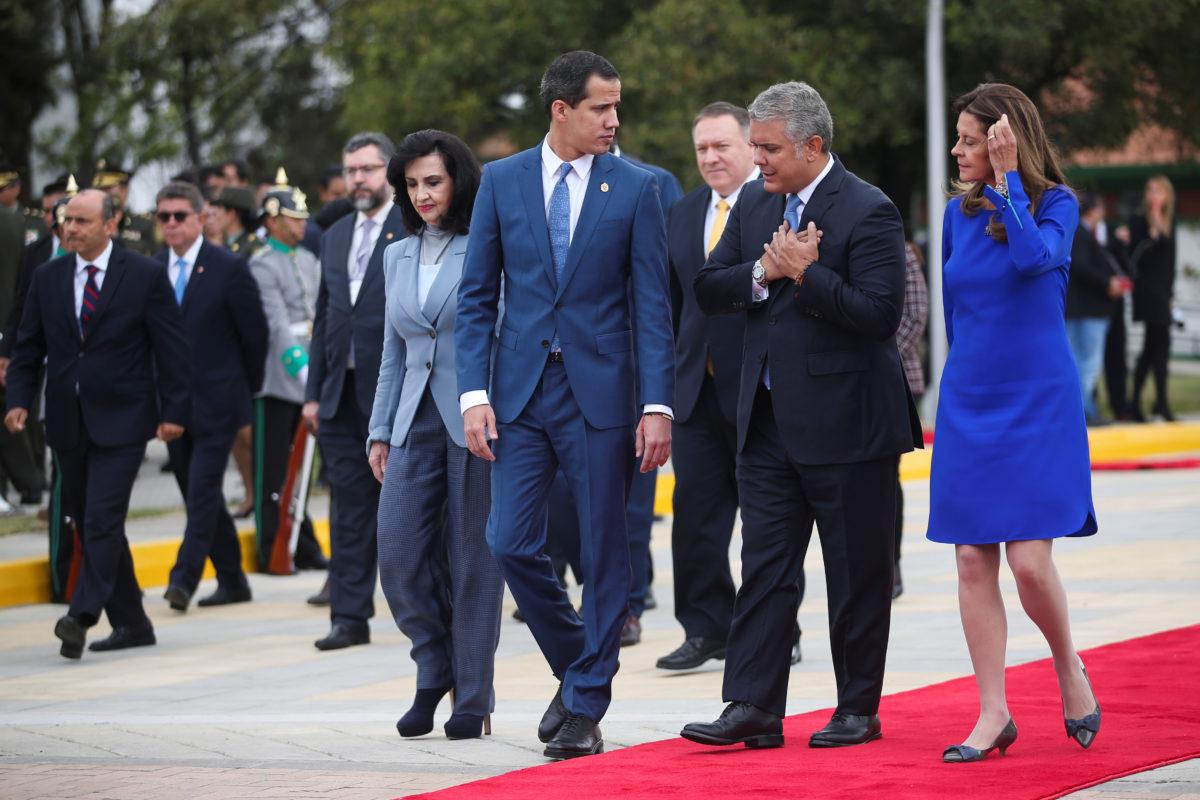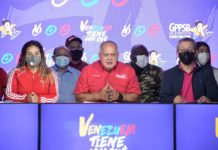Bogota, Colombia (AP) — Venezuelan opposition leader Juan Guaidó joined leaders from the United States and Latin America in condemning President Nicolás Maduro as a promoter of terrorism as he tried Monday to buoy international support for his flagging movement.

The man recognized by the U.S. and nearly 60 other nations as Venezuela’s rightful leader got a red-carpet welcome to Colombia and stood prominently beside world heavyweights, including U.S. Secretary of State Mike Pompeo, who gathered for an international conference to discuss regional cooperation against terrorism.
“We are honored by your presence,” President Iván Duque told Guaidó during opening remarks. “You will always have a friend in Colombia.”
The stately reception stood in stark relief to Guaidó’s recent tussles with national guardsmen blocking his entrance to the National Assembly in Venezuela as the country’s ongoing power struggle have grown more tense.
This week will mark one year since Guaidó stood before densely packed crowds of cheering Venezuelans and proclaimed himself the nation’s legitimate president, launching a bid to unseat Maduro that has thus far proven unsuccessful.
“There’s a big contrast over the international recognition and support Guaidó has in the diplomatic arena and how that translates into concrete actions back in Venezuela,” said Diego Moya Ocampos, a political risk analyst.
Guaidó was expected to use the Colombia meeting to highlight links between Maduro’s government and armed actors like Lebanese militia group Hezbollah and Colombian rebels as part of the opposition’s quest to increase international sanctions on the socialist government.
Venezuela’s pro-Maduro Supreme Court has barred Guaidó from leaving the nation and in the last year, he has only left one other time, sneaking across the border into Colombia to oversee a failed bid at bringing in humanitarian aid in February 2019. He returned on a commercial flight and was allowed back into Venezuela. It’s unknown whether authorities will let him back again this time.
“That risks always exists in Venezuela,” Guaidó said to a bevy of journalists as he headed into a meeting with Pompeo.
Pompeo kicked off the counter-terrorism conference at the General Santander Police Academy in Bogota – where 22 cadets were killed in a bombing last year – by decrying Maduro as an ally to terrorist groups including the National Liberation Army, the Colombian rebel group authorities say plotted the attack.
“These groups must lay down their arms and the Maduro regime must be held to account for its support of them,” Pompeo said.
He praised Latin American nations for going after Hezbollah operatives; several nations including Paraguay, Honduras, Guatemala and now Colombia plan to or have already declared Hezbollah to be a terrorist organization.
Following a separate meeting with Guaidó, he refrained from saying whether the U.S. is considering putting Venezuela on its list of state sponsors of terrorism, stating only that officials are “constantly evaluating” whom to include.
Moya Ocampos said he anticipates that the gathering will raise awareness of the links between Venezuela and Hezbollah in generating illicit revenues and money laundering. But short of additional sanctions, it was unclear what other actions the coalition of nations might take.
Thus far, Maduro’s government has managed to stealthily evade punishing U.S. sanctions by accessing black markets and boosting cash revenue from alternative sources like gold.
“I think they’ve managed to successfully adapt to the existing sanctions,” Moya Ocampos said. “They’ve proven to be very resilient.”
Duque – whose nation has taken in at least 1.6 million Venezuelan migrants – has been an outspoken critic of Maduro and presented a 128-page report at the United Nations last year that he said provided detailed proof of links to terror groups.
But Duque came under fire when it was revealed that at least one of the images purporting to show rebel activity in Venezuela had actually been taken in Colombia.
Maduro has repeatedly denied harboring Colombian rebels, though citizens in the restive Venezuelan border region often report their presence.
Duque shot back at critics who have questioned Guaido’s strength Monday, characterizing his efforts as “brave” in facing off against Maduro.
“Maybe many speculate, ‘Why hasn’t Guaido put an end to the dictatorship?’” Duque said. “This can’t be a discussion about individual capabilities. We know your bravery and that confronting a dictatorship with no limits is a task that goes beyond heroism.”













